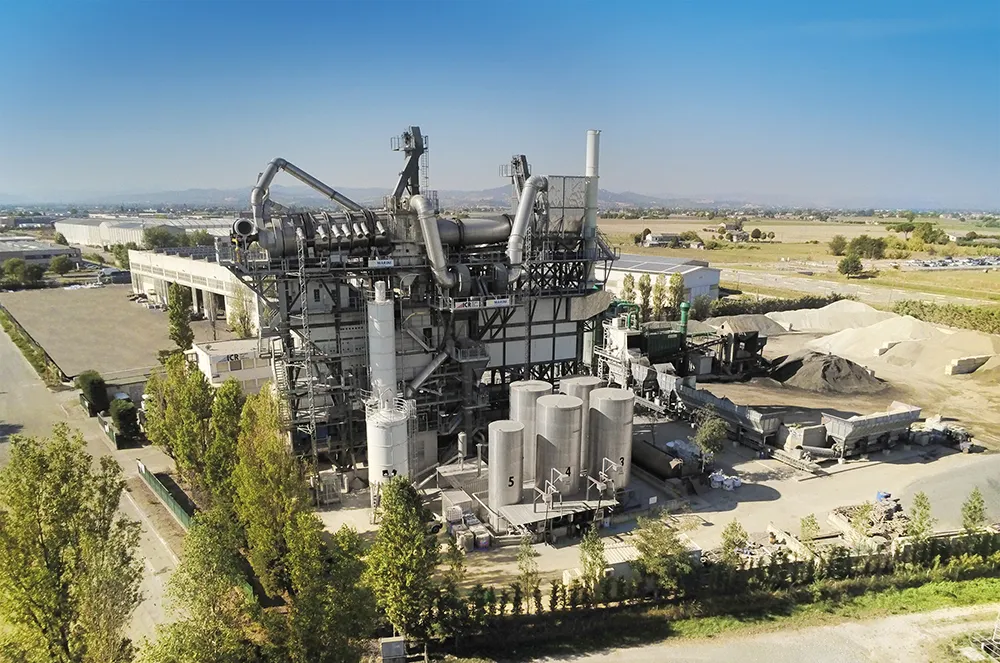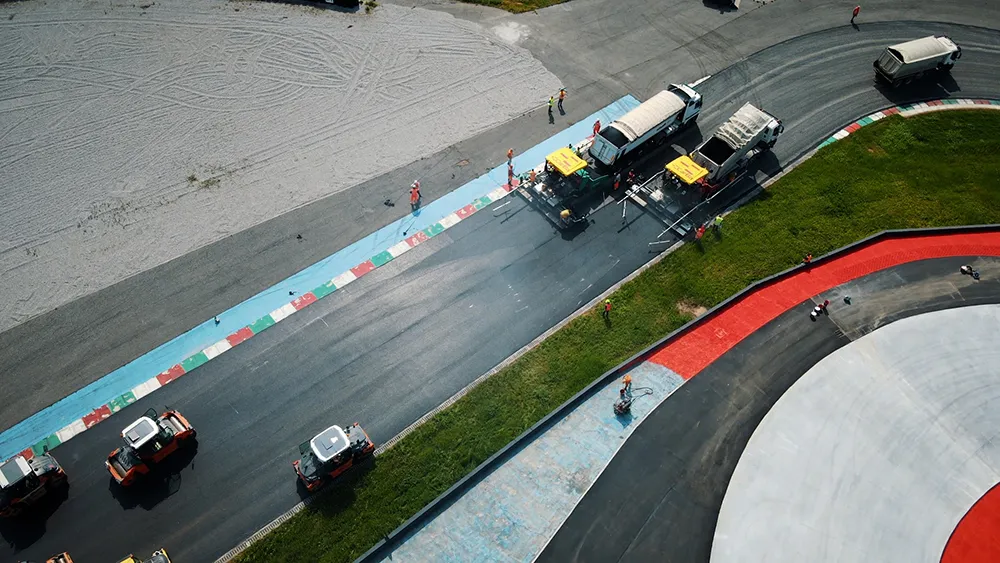
Established in Alfonsine, in the Ravenna province of Emilia-Romagna, in 1899, Marini is among the world leaders in its field. The company’s comprehensive asphalt batching plant range includes the Master Tower, Class Tower, Top Tower, Be Tower, and Xpress. The adjacent Ermont brand also offers continuous asphalt plants in mobile, transferable and stationary types. Additionally, Marini has a Polymer Modified Bitumen (PMB) plant and SAE cold mix plants, a Fayat Group speciality.

Marini customers can also benefit from the company’s technical services and ZEROVOC production-assisting technology, combining the AeroFILTER with the EvoDRYER system. ZEROVOC delivers effective and efficient asphalt plant fumes management and treatment of VOC (Volatile Organic Compound) emissions.
AeroFilter is a filtering system for fumes and blue smoke produced at certain points of the asphalt plant, such as the mixer discharge or along the skip track if the plant is fitted with a lateral storage bin plus the truck discharge points.
Filtering takes place in a series of steps, and the oils are recovered in the lower part of the hopper before being evacuated through special tanks without any external dispersion.
The treated fumes can be sent to the plant stack or receive further heat treatment in the EvoDRYER.
As well as the benefits and improved performance with RAP (Reclaimed Asphalt Pavement) use, the EvoDRYER system also provides heat treatment of the fumes, which could contain classified substances such as VOC.
The conveyed air is fed behind the burner flame through a special cylinder entrance.
This patented system means the air is distributed around the external periphery of the combustion chamber, where the fumes are said to be quickly and effectively treated, and the residual organic composites of the gases are eliminated.

Speaking at Asphaltica, staged in conjunction with the 31st edition of SaMoTer in Verona (3-7 May 2023), Roberto Berardi, Marini-Fayat Mixing Plants product marketing manager, says: “Many asphalt producers, particularly bigger companies in France and other countries in northern Europe, are speaking about the need to reduce their carbon emissions and investing in solutions that can do that. Many smaller Italian companies have historically been keen to reduce spending on asphalt plants. We are saying to them, ‘If you spend a bit more, you can greatly reduce the impact on the environment while also reducing your energy and other production costs.’ We are trying to develop different kits and ‘softer’ solutions for these companies.”
Berardi continues: “The kits we offer to large and medium-sized customers can be retrofitted to their plants or fitted on a completely new plant. For example, our Master Tower has a patented system that uses up to 100% of RAP. The main difference in this system is that it has one burner that heats two drier drums, one for the aggregate and the other for the recycled material. This gives more production flexibility.
“For medium-sized customers, we also offer a parallel [dryer] drum that can be installed on an existing asphalt plant. It guarantees that you stay within permitted emission levels. It is longer, bigger and offers excellent recirculation of air. It means that the flame stays in the centre of the burner and does not come into contact with the material. It means you don’t risk burning the old bitumen in recycled material, and as the drum is longer, you have more time to reach up to 70% of recycled material without an emissions problem.”
Berardi says that domestic market encouragement to increase the RAP used by Italian highway asphalt works contractors, and the need for better production temperature control may lead to new guidelines that encourage contractors to invest in more sustainability-minded asphalt plant solutions from Marini and other leading sector players.
Marini’s plant control software includes kits that optimise the thermal exchange between the hot air created by the flame and the aggregate. “According to the temperature of the fumes, the software automatically adjusts the speed of the dryer drum’s rotation to maintain the quantity of material inside the drum, which is especially important when working with a percentage of RAP [reclaimed asphalt pavement],” explains Berardi.
Berardi says Marini is working on introducing more predictive maintenance features for its asphalt plant range. “They involve sensors that analyse plant support bearing vibrations and trigger alerts if they exceed a certain level. This allows technicians to make necessary changes to components. This is very useful for customers, especially those running just one or two plants, who may not have the same experienced plant maintenance people they used to.”
Commenting on the health of the Italian asphalt plant and supporting services market, Berardi says: “Generally, the market is good. The last two or three years have seen big fiscal incentives offered by the Italian government and the EU, encouraging customers to invest. The incentives are now less, so the market presents new challenges. However, we can continue doing good business in machine sales and servicing existing customer asphalt plants.”









